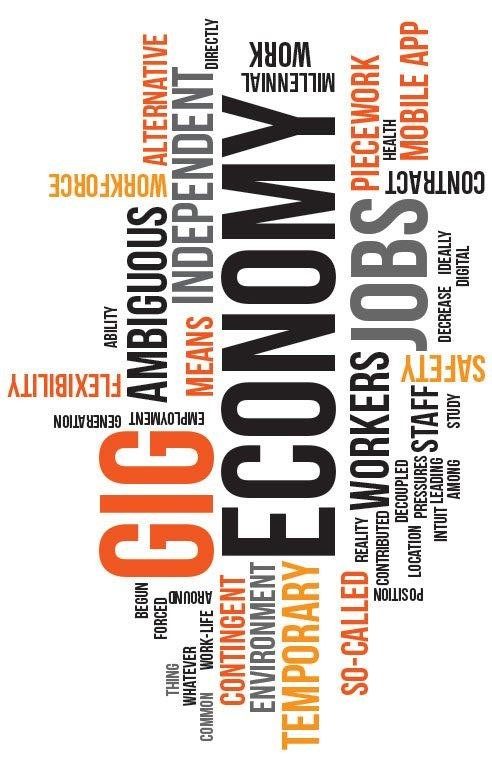Finance
THE GIG ECONOMY CREATES A PERMANENT UNDERCLASS

The estimated reading time for this post is 125 seconds
Continue Reading
Trending Now :
Published
7 years agoon

The estimated reading time for this post is 125 seconds
Everybody seems to have a gig economy job these days, but they provide none of the employee benefits that often help employees move up and stay in the middle class. The gig economy, which consists of a collection of applications aka the “App,” does not consider or see those who work for them as employees. Established companies like Uber, Lyft, Task Rabbit, Airbnb, Turo, and many more classify their employees as independent contractors.
Unlike traditional corporations that often value those who work for them as human resources, the gig economy has humans who serve as middlemen between them and their clients. Because the gig economy does not consider those with gig economy jobs part of their resources, they are less protective of them. The working-class individuals, who work in the gig economy full-time, have no healthcare, paid holidays, vacations, sick time off, or any other standard employee benefits. They don’t get any benefits, nor do they make a living wage.
Those with gig economy jobs cannot make their way up to the middle class even if they work 80 hours a week. Many of them work for more than one gig jobs, but they still can’t make ends meet. The benefits and resources such as healthcare, sick leave, career development, and 401 (k) often provided by traditional corporations substitute for dynamic scheduling, irregular hours, and unsteady workloads.
The gig economy does not believe that the working-class individuals, who serve their clients, are human resources. They don’t protect them and provide them with an option to move up to the next socioeconomic rung. However, Uber, Lyft, and Amazon recognize that those who work for them are humans–not robots. It’s progress considering are little they value them.
Senior Accounting & Finance Professional|Lifehacker|Amateur Oenophile
How wealth passes between generations—trusts, taxes, and the debate. Get the facts, figures, and tradeoffs. Read now.
S&P 7,000 can rise while wages, benefits, and towns fall behind. See why the market isn’t the economy—read now.
How wealth passes between generations—trusts, taxes, and the debate. Get the facts, figures, and tradeoffs. Read now.
By FMC Editorial Team
S&P 7,000 can rise while wages, benefits, and towns fall behind. See why the market isn’t the economy—read now.
By MacKenzy Pierre
Credit card balances are rising as savings fall. See what it means—and the 30/60/90 plan to escape 25% APR debt.
By Article Posted by Staff Contributor
Fired with a 401(k) loan? Avoid taxes, offsets, and deadline traps with this step-by-step checklist. Read now.
By Article Posted by Staff Contributor
Split finances without resentment. Any couple, any income ratio. Use the worksheet + rules—start today.
By Article Posted by Staff Contributor
Invest or pay off your mortgage? See a $500k example with today’s rates, dividends, and peace-of-mind math—then choose your plan.
By Article Posted by Staff Contributor
Gold, silver or Bitcoin? Learn what each is for—and how to size it—before you buy. Read the framework.
By Article Posted by Staff Contributor
Florida HOA fees are surging. See what lawmakers changed, what’s next, and how to protect your budget—read before you buy.
By Article Posted by Staff Contributor
Why buyers are backing out of home deals in 2026—and how to avoid costly surprises. Read the playbook before you buy.
By Article Posted by Staff Contributor
Learn how money habits form—and how to rewire spending and saving using behavioral science. Read the framework and start today.
By FMC Editorial Team
How wealth passes between generations—trusts, taxes, and the debate. Get the facts, figures, and tradeoffs....
S&P 7,000 can rise while wages, benefits, and towns fall behind. See why the market...
Credit card balances are rising as savings fall. See what it means—and the 30/60/90 plan...
Pingback: America Is Still a Middle-Class Country - FMC
Pingback: The Fight for 15 Is Our Fight Too - FMC Politics - %
Pingback: 5 WAYS TO SAVE MONEY IF YOU ARE BROKE - FMC
Pingback: Debt You Can't Discharge Through Bankruptcy - Personal Finance FMC
Pingback: Uber and Lyft Can Keep Taking Advantage of Their Rideshare Drivers, for Now - Gig Economy
Pingback: What Matters to Middle-Class Voters - FMC